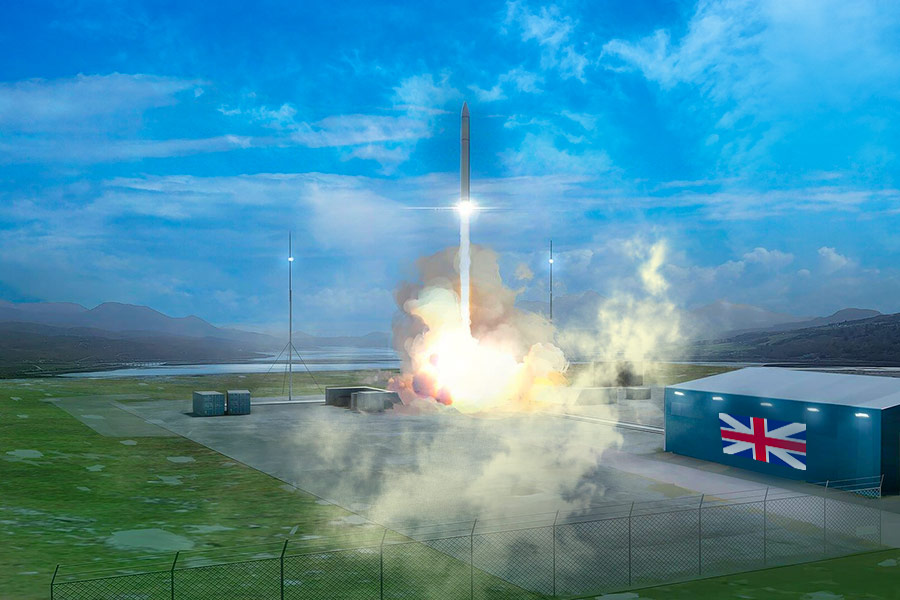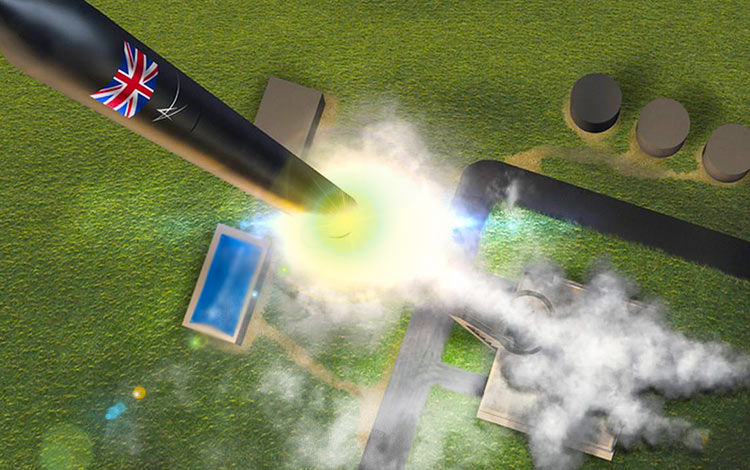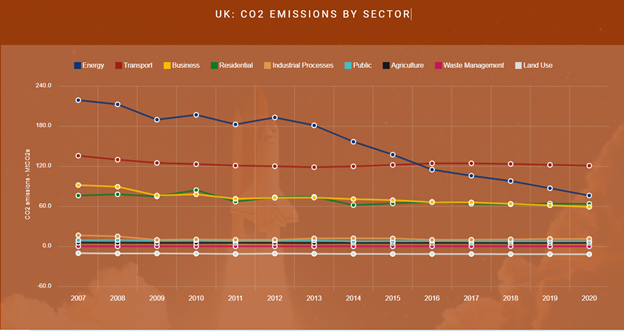UK Spaceports Pros and Cons: Economic Growth Vs. Environmental Impact
25th Oct 2021
The space industry is growing four times faster than the rest of the UK economy and accounts for 7% of the global space market, but with the commissioning of the first UK spaceports, this figure is expected to grow even further. Over the past ten years, the UK space sector has grown by almost 400 companies, and Scotland has become the 2nd largest producer of smallsats in the world after California. The UK satellite industry is currently valued at £300 billion of GDP, but the country’s ambitions go much further.

British Spaceflight Programme adopted in 2017 aims to establish commercial vertical and horizontal small satellite launches from commercial UK spaceports. According to government calculations, this will increase the UK’s share of the global space market to 10% by 2030. A total of seven launch sites are planned.
- Space Hub Sutherland, Highlands of Scotland.
- SaxaVord Spaceport (Ex. Shetland Space Centre), Unst, Shetland Islands, Scotland
- Prestwick Spaceport, South Ayrshire, Scotland
- Spaceport Cornwall, Newquay, South West England
- Spaceport Snowdonia, Llanbedr, Gwynedd, Wales
- Spaceport Machrihanish, Campbeltown, Argyll, Scotland
- Spaceport 1, Scolpaig Farm, North Uist, Outer Hebrides, Scotland
The locations were selected taking into account favourable geographic conditions: elevation, proximity to the sea, remoteness from densely populated areas, a short trajectory for launching into polar orbits, partially ready infrastructure, and road map.
The sites are designed to launch light and ultralight launch vehicles with a payload mass of up to 1,5 tonnes and will be able to serve both orbital and suborbital flights. Estimated commissioning time – late 2021-2023.
Spaceports in Cornwall, Sutherland, and Shetland have already passed all the conciliation procedures and are in the process of issuing licenses. In addition, some aerospace companies have expressed willingness to launch from these sites – for example, Virgin Orbit, founded by British billionaire Richard Branson as well as Scottish Skyrora Ltd, and Orbex Space.
Orbital Today analysed the potential pros and cons of UK spaceport operations.
What benefits will UK spaceports bring

1. Satellite Launch cost reduction
Until now, the orbital launch market in the UK has been absent as such. The first and only Black Arrow rocket programme was phased out in 1972, and, since then, all British satellites have been sent into space by American or European Space Agency launchers from spaceports in the United States, French Guiana, and Baikonur in Kazakhstan. UK spaceports will allow the country to partially opt-out of their services. Paying for payload delivery to remote spaceports and leasing the sites will no longer be necessary. Besides, with private British launchers, it will be possible to provide a full cycle of local launch services.
2. Launch income
Each UK spaceport is estimated to handle at least ten launches per year. This will make the UK a central hub for spaceflights not only in Europe but worldwide.
3. Providing new job opportunities
According to experts, spaceports commissioning will significantly revive the economy of their respective regions and create several hundred new job opportunities in each — both at the launch sites themselves and in related businesses.
4. Economic and Investment Growth
As already mentioned, UK spaceports will help increase the UK’s global space market share to 10% by 2030, amounting to around £40 billion. At the moment, the industry capitalisation is approximately £17 billion. Taking into account all other factors, such growth will significantly boost the country’s economy and attract investment not only to the space industry but also to other market segments.
5. Education
Today, the UK space sector employs about 50,000 people with an average skill level higher than any other industry. A study by the Office for National Statistics shows that 75% of the UK’s space sector employees have at least a bachelor’s degree, 13% are expert qualifications, and the remaining 11% hold other qualifications, including ESA diplomas in space. Introducing the launch services market will attract young people to the space sector, encouraging them to study STEM subjects for higher education, thereby preparing them for careers in the space industry.
6. Space Tourism
UK spaceports commissioning will turn their respective regions into major tourist attractions. This will boost the tourism industry, eventually resulting in a developed tourist infrastructure. In the long term, spaceports will also be able to service international suborbital flights, reducing the travel time from one point to another by 20 times. For example, it will be possible to fly from Scotland to Sydney in just 40 minutes, while a direct flight by plane takes about 19 hours.
So, we have six convincing pros for the UK spaceport construction. And now, to be completely objective, let’s take a closer look at the scabbed sheep in this flock.
Probable negative impact on environment
The negative impact on the environment is perhaps the only downside of UK spaceports operation. Let’s see how justified this argument is.
Ozone layer depletion
The launch vehicle carries ten times more fuel than a passenger airliner. When fuel is burned, tonnes of CO2, soot, and other harmful particles are emitted into the atmosphere, which depletes the Earth’s ozone layer and leads to climate change. The UK already has enough industries with high CO2 emissions.

Current research shows that rocket launches cause up to 0.1% ozone loss, but this figure could rise to 1% over the next decade as space tourism grows.
Harmful effects on human health, flora, and fauna
Research has proven that rocket fuel and its combustion products are toxic. That is why people in the spaceport-adjacent territories are more likely to suffer from diseases of the endocrine system and blood. Acid rains falling along spacecraft trajectories are destroying the flora and fauna of the planet; vegetation perishes; animals are poisoned by grass where the products of rocket fuel combustion settle.
The problem can be minimised by creating rockets that run on liquid fuel made from environmentally friendly materials. Fortunately, work in this direction has been underway for a long time and is already bringing successful results. In particular, Skyrora offers Ecosene fuel obtained from recycling plastic waste.
One can neither deny the problem of the noise that rockets produce during launch and in flight. In March 2021, the Royal Society for the Protection of Birds (RSPB) raised concerns about the possible impact of satellite launches on birds and protected species on the Unst Island. The statement refers to “the potential impact of rocket launch noise on breeding protected birds.” Even though the sites are located in sparsely populated areas, local residents will inevitably suffer from noise, too.
The problem of spent stages falling
The reusable first-stage technology is just getting started. Now, most launch vehicles drop the first stages onto land or into the sea. Naturally, this leads to soil and water pollution, deformation, seismic vibrations, etc.
The table below shows the main factors of the rocket launches impact on the environment.
| Impact causes | Impact factors | Impact types | Impact areas | Impact consequences |
| Rocket fuel combustion products | “Outraged” ionosphere |
Electromagnetic | Near-Earth atmosphere | Technogenic magnetic storms |
| Falling fragments of the rocket spent stages | Impact waves | Acoustic | Seismic vibrations | |
| Launcher fragment part | Thermal | Vegetation cover | Forest fires | |
| Mechanical | soil, rock formation, plants | Deformation, Seismic vibrations |
Conclusion
Wealth or Health is an eternal dilemma for humanity, and the first component is winning so far. And yet, let’s hope that one day the space tech will help in that. Hopefully, low-carbon UK spaceports will help balance the scales.






Thank you for your comment! It will be visible on the site after moderation.